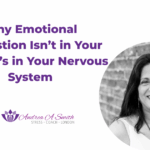A panic attack is a sudden rush of physical symptoms combined with uncontrollable anxiety. A panic attack is a dramatic false alarm that changes the mind and body. Recognising this is the initial step to becoming aware of what is causing you anxiety and managing panic attacks, and coping with panic attacks.
Dealing with panic attacks isn’t easy. Most people suffer from these once or twice, but some have them for a lifetime. These attacks are noticed in adults more than children and older people. However, they can also happen in school kids because of the stress at school or university.
Before you try coping with panic attacks, you need to try to manage your stress and tension.
Managing Panic Attacks Symptoms NHS You Should Know
Most people with panic attacks at night may have trouble breathing (feel like you cannot catch your breath), a racing heartbeat, or sweating.
Panic attack symptoms vary from breathlessness to worrying thoughts, and these thoughts can have an impact on your daily life. You may also feel that something terrible is about to happen.
Below are the common signs of having a panic attack:
· Headache
· Dizziness
· Nausea
· Difficulty in breathing
· Fear
· Chest pain
· Shaking and trembling
· Sweating
Managing panic attacks and Coping with Panic Attacks
Looking at somebody having a panic attack or having one yourself can be frightening for some people. You will find different home therapies to prevent these. Nonetheless, you will find simple, soothing ways to manage them. Below are some tips you can try:
· Visualise your happy place and remember it will pass
Most of us have a happy place in mind, such as a favourite childhood spot. You need to visualise that place in the world where you feel most chill and relaxed at. It will help in soothing your body and mind; no matter how scared you feel, it will pass.
· Think of an affirmation that makes you feel good
Did you know those positive affirmations can help you manage your anxiety, fear and tension? All you need to do is write down and repeat the affirmation and put it in a place where you can look at it daily. Also, keep a soothing scent nearby (lavender or another essential oil), and it will help by tapping into your senses and staying grounded.
· Practice Mindfulness
You are becoming mindful of where you are and how you are feeling. Choose a quiet spot. Close your eyes and think about what your panic attack causes are and how you are reacting to these. In this calm place, make yourself comfortable and focus on breathing. Meditate and relax in the HERE and NOW; this can make you feel better.
· Deep breathing techniques
In case you don’t know yet, breathlessness is a typical sign of anxiety that can result in a panic attack. Taking long deep breaths while having a panic attack is essential. Take 7 in-breaths in, wait there for a few seconds and breathe out to the count of 10. It will help keep your body and mind in control. Make sure you concentrate on breathing in and out.
· Become aware of your panic attacks
Another tip for managing your panic attack is to realise you have one and note down your triggers. Practice muscle relaxation exercises so to reduce muscle tension. See a Coach or a Therapist who can help you with coping strategies (build your self-esteem) when you feel anxious. They can help you with perspective and daily tips to cope.
Overall, a panic attack is like a wave that you cannot anticipate coming at you. However, we are sure you can efficiently deal with it. There you have it! These are the essential tips you can do to cope with anxiety attacks properly and manage panic attacks. Check out the nearest Therapist or CALL now if you can’t cope alone.










